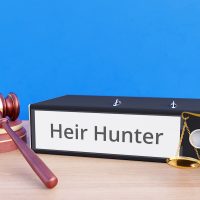What Do I Need to Know If I’m Contacted by an Heir Hunter?

When a person dies, the administrator of the estate will contact heirs so they can receive their proper inheritance. Depending upon how the will is written, or whether there is a will at all, the estate administrator may need help locating all the heirs and may employ the skills of a professional forensic genealogist for help. At the same time, unscrupulous heir hunters may be combing death notices and obituaries, looking for estates that may have unknown or hard-to-locate heirs. These heir hunters contact potential heirs directly and try to get them to sign away much of what the estate may owe them. For advice on what to do if an heir hunter contacts you, read on. If you are an estate administrator or executor, reach out to a dedicated and professional forensic genealogist for qualified, legitimate, and experienced help identifying the proper heirs to an estate.
Do your research – Are they genuine?
If you are contacted by an heir hunter, the first thing you should do is find out as much information as you can find about the firm. Look up their website, check their business address, run some internet searches to see if they are a scam. They may simply be trying to get personally identifying information from you or get you to sign a contract requiring you to pay a fee even if you inherit nothing.
Moreover, a web search might clue you in to the fact that, even if they do help people get an inheritance, they charge much more than necessary. State law regulates how much heir hunters can charge for fees, and you should not be tricked into agreeing to pay more than legally appropriate.
Heir hunters are typically not hired by the estate
There are legitimate forensic genealogists and probate researchers. The estate will retain these firms to find the appropriate heirs if someone dies intestate (without a will), and it is more likely that someone from the estate such as the administrator or the trustee will contact you once you have been identified. Unlike an heir hunter, the estate will not force you to pay a large finder’s fee in exchange for notifying you of the death. The heir hunter is more interested in taking an exorbitant cut of your inheritance, sometimes in the range of 25 to 40 percent, an amount almost certainly disproportionate to the work it took to track you down.
Do not feel time-pressured
If a purported probate researcher tells you that time is of the essence and that you will lose out on your inheritance if you do not sign their contract quickly, they are likely lying to you. If you have the right to inherit property pursuant to a will or estate law, then you will likely have time to evaluate your options. You should ask for the name and number of the estate administrator so that you can speak with them directly.
The administrator of the estate or the trustee will likely find you by their own efforts, and you will end up paying a much smaller cost for the right to inherit what you are owed. If they are legitimate, you should be able to ask questions about all of the details about the estate; they should not try to force you to sign a contract without knowing all of the particulars.
Moreover, even if they refuse to give you this information, you can start to conduct research of your own. If you can find out what estate the heir hunter is trying to feed on, then you will be able to collect your inheritance without paying an unreasonable fee.
Talk to your family
If you have siblings, cousins, or any other family members who may be related to the deceased, reach out to them. Find out if the heir hunter has contacted them or if they have spoken with the estate. Make sure none of you sign a contract with an heir hunter until you have all done your research to find out where the inheritance may be coming from and what the details are.
If you’re an estate administrator in need of skilled help in evaluating the legitimacy of heir hunters or identifying and locating missing heirs to an estate, contact a passionate and thorough forensic genealogist at Von Langen, LLC, at 561-748-2936.